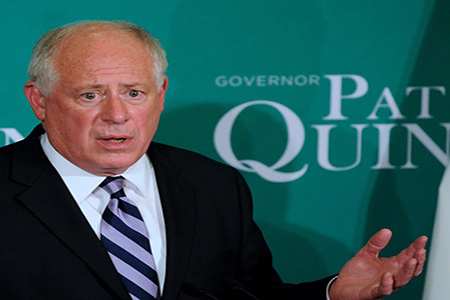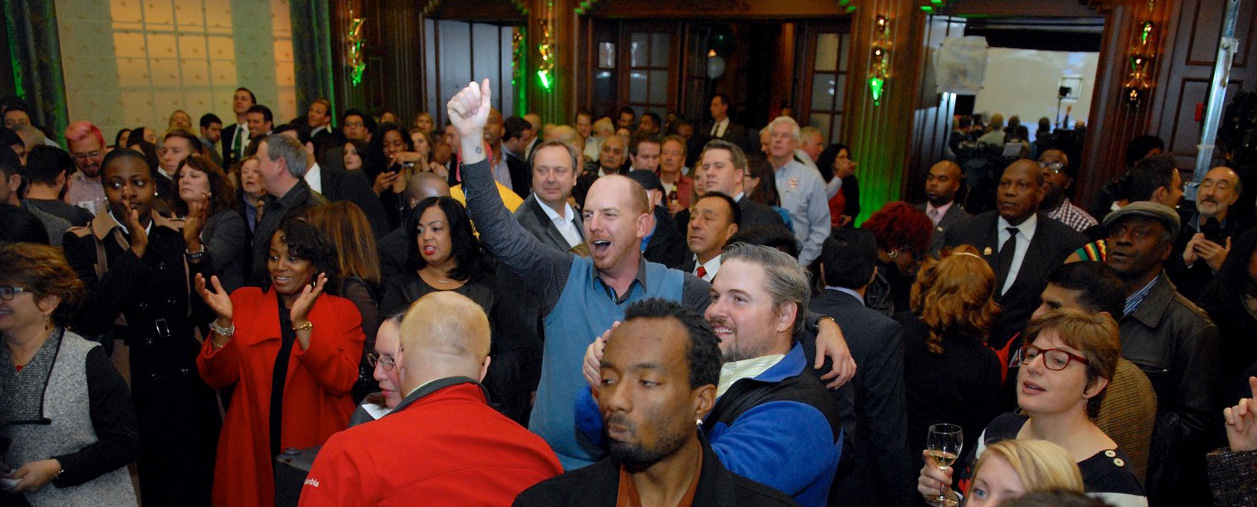
CHICAGO–(UPDATED) Gov. Pat Quinn said Tuesday night that he wouldn’t concede the election to Republican candidate Bruce Rauner until all the votes have been counted, well on Wednesday he conceded.
In probably one of the shortest speeches of Quinn’s political history, less than three minutes, he addressed reporters at a press conference held at the Thompson Center.
“It’s clear that we do not have enough votes to win the election,” he said.
The Associated Press showed that 99 percent of Illinois’ precincts had Rauner at 51 percent of the vote, where Quinn was at 46 percent.
Quinn said that he will continue fighting for those living in poverty by helping to raise the minimum wage from $8.25 to $10 an hour by Jan. 1st of next year.
“I really look forward to working with the legislature with the time I have left as governor to get that job done, he said. I think it’s an important mission for all of us to do right by people who work hard, who work 40 hours a week, who do everything according to the rules, they shouldn’t have to live in poverty.”

Rauner, who claimed victory Tuesday night, issued a statement on Wednesday.
“I thank Governor Quinn for his many years of service to Illinois and appreciate his commitment to making this a smooth transition. I look forward to getting to work to make Illinois the most compassionate and competitive state in the nation,” Rauner said.
On election day, Quinn remained optimistic that he still had a chance of being reelected because not all the votes were in. Several people had waited until as late as 3 a.m. to vote after voting was extended at several Chicago polling stations. The Associated Press reported that at least 2,000 judges out of more than 10,000 who were scheduled to work were no-shows. They received bogus automated telephone calls over the weekend, which may have dissuaded hundreds of city election judges from showing up at the polls, according to Chicago election officials.
Election board spokesman Jim Allen said Tuesday that in some cases, a shortage of judges contributed to the voting delays.
In spite of that, Quinn supporters gathered at a downtown hotel celebrating what they had hoped would be the reelection of the governor. It started off as a close race with the governor in the lead with 54 percent and Rauner behind by 10 percent.

The celebration kicked off early as people cheered sporadically, sipped on wine and shared laughter with other guests.
Many elected officials attended the party. Everyone who spoke with The Chicago Defender said that they were hopeful that Quinn would win.
“I am encouraged by the early voting numbers,” Sen. Jacqueline Collins (D-16) said earlier in the night.
“I think the African American community was very responsive to the message of minimum wage, the ban on assault weapons and basically just keeping President Barack Obama’s back,” she said.
Collins said that African Americans have the reputation of not voting, but she said that they have already proved those people wrong. She said Black people know what’s at stake if Quinn doesn’t win so they did their best to prevent his opponent from taking office.
Rev. Jesse Jackson from Rainbow PUSH said that his coalition pushed hard to encourage voters to hit the polls early. Before Rauner gained the most votes, Jackson said that if the Republican won, Illinois residents would feel the affect.
“Many of the programs that have helped sustain the unemployed will be threatened, ” he said. Other areas include minimum wage student loan forgiveness and women’s rights, he said.
State Sen. Toi Hutchinson (D-IL) said she was hopeful that Quinn would win again.
“We are hopeful that people will see elections have consequences and that people will recognize that there is a stark difference between the candidates, it is always interesting to see when it is neck and neck like this so we are just going to have to wait and see,” she said.
Well they waited, and once Rauner became the projected winner, the cheering came to a halt and the energy instantaneously drained out of the room. No one wanted to accept that Illinois might have a Republican governor. By then, Quinn still hadn’t addressed the crowd of supporters. When he did come out, it was well after 11 p.m. and people had been there since 7:30 p.m. At that point he hadn’t given up. He stressed that there were still votes to be counted.
Meanwhile, over at Rauner’s election party down the street at the Hilton Chicago, Republicans were celebrating. During his campaign, Rauner was able to pull in some African Americans. A coalition of Black religious leaders endorsed Quinn’s opponent.
Pastor James T. Meeks of Salem Baptist Church of Chicago said that he was the first African American to endorse Rauner because the Democratic party has taken advantage of the Black vote for too long. It is time for a change, he said.
Shawn Walker, committeeman for the 28th Ward said that he voted Democrat his entire life until this year. He said he is ready for change and that’s why he encouraged other African Americans to vote for Rauner. They shouldn’t be afraid, he said because this change will benefit them.
“For several years we have continued to see our democratic elected officials take us for granted, he said. If we embrace change, there’s an opportunity for us to get change.”

